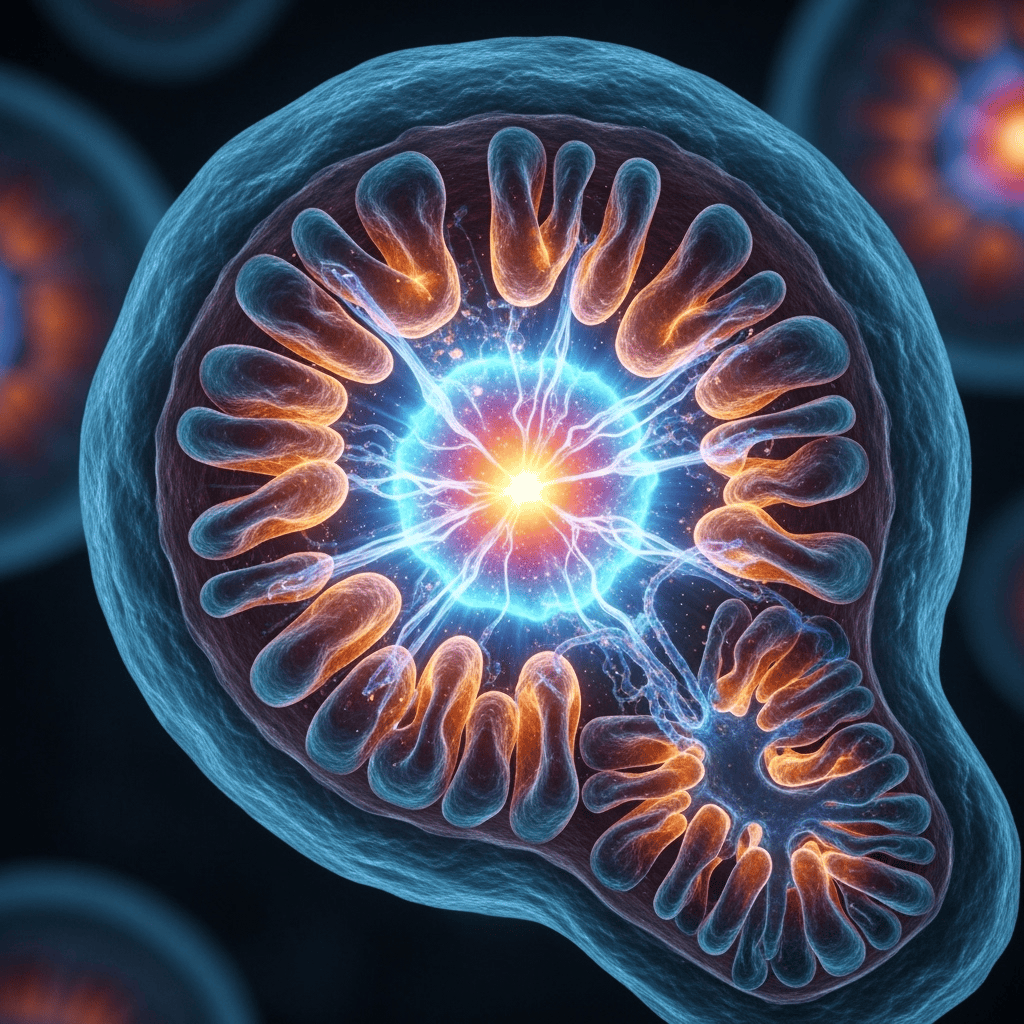Hack Your Internal Power Plants: The Cellular Secret to Boundless Energy and a Longer Life.
Ever feel that afternoon energy crash? Wonder why recovery takes longer as you age, and your zest for life seems to dim? Most of us blame it on stress, lack of sleep, or simply “getting older.” But what if I told you the real reason—and the key to reclaiming your vitality—lies hidden deep within? In trillions of microscopic powerhouses working tirelessly inside every cell of your body.
Meet Your Mitochondria: The Architects of Your Vitality
Imagine your body as a technologically advanced city. Each cell is a building, and within each one, there’s a power plant. These are your mitochondria. You didn’t inherit them from both parents; they come exclusively from your maternal line, passed down through generations like an ancient spark of life.
Their job is singular but absolutely critical: to convert the food you eat (glucose) and the air you breathe (oxygen) into energy in the form of a molecule called ATP. This is the energy currency of your life. Every muscle contraction, every thought, every heartbeat—all powered by ATP produced in your mitochondria.
The Energy Paradox: When Your Power Plants Start to Smoke
The energy production process is incredibly efficient, but like any power plant, it has byproducts. In this case, they are reactive oxygen species (ROS), more commonly known as free radicals. In small amounts, they are harmless. The problem begins when your mitochondria slow down, become damaged, and grow less efficient. They start producing less energy and more “exhaust fumes”—free radicals.
This state, known as oxidative stress, is one of the primary drivers of aging.
“I believe that the loss of information—both digital in the genome and analog in the epigenome—is the main cause of aging. And mitochondrial damage accelerates this process at a frightening pace,” says Dr. David Sinclair, a leading longevity researcher at Harvard Medical School.
Damaged mitochondria mean less energy day-to-day, slower skin regeneration (more wrinkles), and a higher risk of neurodegenerative and metabolic diseases. It’s a silent saboteur, operating at the cellular level, whose effects you feel as “aging.”
System Reboot: 4 Ways to Supercharge Your Mitochondria
The good news? You have immense influence over the condition of your internal power plants. You are not doomed to a slow “burnout.” You can actively manage your cellular energy. Here’s how:
- Move with Intensity: Intense, even brief, exercise like sprinting or HIIT sends a shock signal to your cells. In response, the body not only repairs old mitochondria but also creates new, stronger ones. This process is called mitochondrial biogenesis.
- Eat Colors and Healthy Fats: Antioxidants from berries, dark chocolate, and green vegetables are your “cleanup crew,” neutralizing free radicals. Healthy fats (avocado, olive oil, nuts) and nutrients like Coenzyme Q10 and magnesium are the fuel and spare parts for your cellular engines.
- Embrace Fasting: Intermittent fasting or eating within a restricted time window (e.g., 8 hours) activates a process called mitophagy. This is cellular recycling, where the body “eats” and removes damaged, dysfunctional mitochondria, making way for new ones.
- Get Hot and Cold: Thermal shock therapy—like cold showers or saunas—forces your body to adapt, which stimulates mitochondrial health and efficiency.
Managing your energy is about more than just another cup of coffee. It’s a fundamental process that determines the quality and length of your life. Healthy mitochondria are the secret to biological youth, regardless of your chronological age.
Your body holds the potential for incredible regeneration. The question is: do you know how to unlock it? The answer lies in understanding and optimizing your cellular power plants.
Do you know your true longevity potential? Your habits, lifestyle, and genetics create a unique profile. Our advanced tool, based on the latest research and artificial intelligence, can analyze it for you. Complete our survey and unlock your personalized longevity report. Discover your potential future today!
Interesting Scientific Publications:







